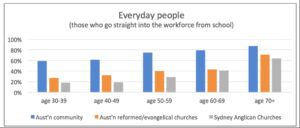This article was originally part of a paper prepared for The Gospel Coalition Australia’s National Christian Leaders Mini-Summit on the topic ‘The Future of the Gospel in Australia’ held at Moore Theological College on 19th June 2025.
Did you know that seventy per cent of Australian adults went straight into the workforce from school? Since they make up the bulk of people in our society I will use the term ‘everyday people’ to describe them in this article. They are a large and diverse group. Some have formal qualifications obtained through TAFE (vocational tertiary education), like hairdressers and plumbers. Some can be very wealthy, like some builders and entrepreneurs. Others have no formal qualifications and have learned their skills on the job, such as truck drivers, factory workers and some who work in media, IT or the arts. Some might be working two or three jobs and still struggling to pay the bills. But while they make up seventy per cent of Australian adults, they are significantly under-represented in our churches.
Congregations versus Population
In 2021, the National Church Life Survey surveyed the educational attainment of those in church. The graph below shows the results for Sydney Anglican churches and other Protestant churches where at least one leader identified as Reformed, compared with the educational attainment of the general Australian population.[1]

In all age categories, the proportion of those without a university degree in our congregations is worryingly low. What’s perhaps most concerning is the large gap that exists between those aged thirty to thirty-nine years old. In this age bracket we would need to double the number of ‘everyday people’ if our churches were to more closely reflect the community.
One step towards better engaging with everyday people in our communities is better empowering those everyday people who are in our congregations. In the rest of this article I want to spell out some obstacles to everyday people taking on word ministry and leadership roles in Reformed evangelical churches.
Lack of Confidence in Understanding the Bible
Dave is a truck driver who participated in some Bible studies I led a while ago. He struggled through school and his negative experience of education affected how he views himself. Sometimes when I asked Dave a question about the Bible passage we were looking at, he would say, ‘I don’t know, Andrew, I’m just a dumb truck driver.’ It was a way for Dave to protect himself from failure. But was it true? Absolutely not! It was a lie that Dave learned from our education system and society. How do I know it wasn’t true? When pressed to give an answer, Dave often shared the same insights into the passage that I had read in the commentary I had used to prepare for the study, written by an Old Testament academic with a PhD. Further, Dave’s hobby is to take apart old cars, rebuild them, get them registered and sell them. That’s not the sort of thing a ‘dumb’ person could do.
Dave’s experience of education is all too familiar for many everyday people. Their view of themselves as inferior, incorrect though it is, has been compounded by many university-educated people’s belief that it is true and by their struggle to thrive in a school system that was geared towards those who would go on to university. This makes it extremely hard for everyday people like Dave to believe that they could ever contribute in word ministries or leadership in local churches run by ‘professional’ people. And this further contributes to them thinking, ‘I don’t belong here.’
Reluctance to Lead Up Front
Ten years ago, I realised the importance of having everyday Christians up front in our church. It shows we value the contribution they bring to our gathering. They often communicate in way that will connect with other everyday people and bring a freshness that encourages professionals too.
For this reason, I asked Chris, who had led occasionally in prayer, if he would be willing to lead a service. Chris was in his fifties, had been a Christian for about ten years, loved the Lord, and regularly mowed the grounds of our church. He was authentic, gentle, generous and honest about the struggles and joys of his walk with Jesus. But Chris didn’t think he was the sort of guy to lead the service. There were no other people like him leading or preaching in church. Chris was a mechanic who managed an engine repair shop. I told Chris that was exactly why he was the sort of person we needed leading a service at our church. He laughed and thanked me for the invitation but declined. I asked if he minded if I asked him again in six months’ time. He was happy with this.
I met with Chris fortnightly to read the Bible and pray for the next two and a half years before he finally agreed to lead a service. What was the clincher? Why did he finally agree to have a go? It was after Brian, another everyday Christian in his fifties, did it. Chris thought, ‘If Brian could have a go then maybe I could too.’ When Chris finally did lead the service, his authenticity, openness and honesty was extremely refreshing and edifying for both the professional and everyday Christians in our congregation.
Intimated in ‘Professional’ Ministry Settings
The fear of not being good enough for professional people runs deep for everyday Christians and is a significant obstacle to getting them involved in up front ministry and leadership. For many, it is a fear they carry their entire lives. Bruce grew up on a farm. He was often encouraged by his dad to miss school in order to help with farm work. His everyday family did not value education like professional families do. Bruce wasn’t urged to go to university by his parents; he did a carpentry apprenticeship. After serving as a lay leader for many years in his local church, Bruce was convicted to leave his job train to be a pastor. Bruce headed to Sydney to go to theological college.
He said it was very intimidating to be surrounded by a group of students who had all been to university. Many in our society, both professionals and everyday people, believe that everyday people are less intelligent because they didn’t excel at school or go to university. This creates a prejudice that is conveyed in subtle and not-so-subtle ways. In Reformed evangelical circles, for example, a theologically-trained leader without a prior university degree can be seen by some as less competent to protect the church against heresy.
Twenty years later Bruce now has a university degree in theology and leads a church of over eight hundred people, but put him in a room full of professional pastors and he still hesitates to speak. Even after all that he has accomplished, Bruce still feels second-class around his professional peers. A socioeconomic class consciousness can be perceived by others even if we don’t recognise it ourselves. As Ian, a factory worker seeking to reach out to other factory workers, wrote:
The workers don’t think they are worthy enough to go to church because of the fact that they look down on themselves. They often think of church as an upper-class gathering so they feel like by going to church they will be looked down on.
This article is just an introduction to the challenges facing reformed evangelical churches wanting to raise up leaders and encourage word ministry among the seventy per cent of Australians who have gone straight into the workforce from school.
[1] M. Pepper, R. Powell and S. Sterland, ‘Educational Attainment for churches that consider themselves “reformed”: Results from the 2021 National Church Life Survey for Andrew Beddoe, Vocational Bible College’, NCLS Research, 2023; Australian Bureau of Statistics, ‘Education and training: Census: Information on qualifications, educational attendance and type of educational institution’, accessed 3 April 2023.










